 If you or your family were injured during a disaster like a hurricane, earthquake or forest fire, wouldn’t you want your health data to be available to first responders and others who are there to provide care? We thought you might, and we are partnering with the State of California to pilot just such a project. Working at the Office of the National Coordinator for Health Information Technology (ONC), we have had the opportunity to leverage investments in health information technology to spur innovation in public health and preparedness...
If you or your family were injured during a disaster like a hurricane, earthquake or forest fire, wouldn’t you want your health data to be available to first responders and others who are there to provide care? We thought you might, and we are partnering with the State of California to pilot just such a project. Working at the Office of the National Coordinator for Health Information Technology (ONC), we have had the opportunity to leverage investments in health information technology to spur innovation in public health and preparedness...
first responders
See the following -
2019 International Conference on Disaster Medicine and Hurricane Resiliency Draws Hundreds
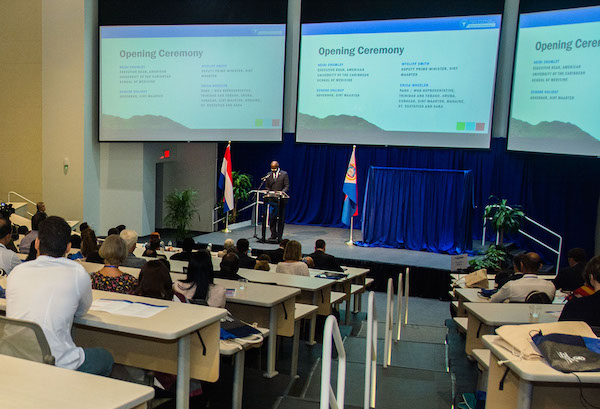 More than 280 healthcare professionals, emergency preparedness experts, and government leaders gathered on campus March 8-11 with the goal of uniting their collective experience and expertise to increase their communities’ ability to manage hurricanes and other disasters. Attendees represented 12 countries, including 9 Caribbean islands, and a multitude of backgrounds in disaster preparedness and response, including disaster medicine and veterinary medicine, nursing, hospital administration, mental health, telehealth, EMS and first responders, disaster recovery and humanitarian assistance, medical education, and more.
More than 280 healthcare professionals, emergency preparedness experts, and government leaders gathered on campus March 8-11 with the goal of uniting their collective experience and expertise to increase their communities’ ability to manage hurricanes and other disasters. Attendees represented 12 countries, including 9 Caribbean islands, and a multitude of backgrounds in disaster preparedness and response, including disaster medicine and veterinary medicine, nursing, hospital administration, mental health, telehealth, EMS and first responders, disaster recovery and humanitarian assistance, medical education, and more.
- Login to post comments
Academic Biomedical Research Community Should Take Action to Build Resilience to Disasters
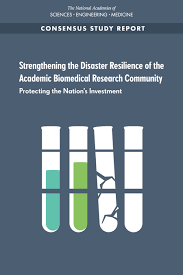 The academic biomedical research community should improve its ability to mitigate and recover from the impacts of disasters, says a new report from the National Academies of Sciences, Engineering, and Medicine. The consequences of recent disasters, from hurricanes to cyberattacks, have shown that the investments of the U.S. federal government and other research sponsors -- which total about $27 billion annually -- are not uniformly secure. The report recommends 10 steps that academic research institutions, researchers, and research sponsors should take to bolster the resilience of academic biomedical research.
The academic biomedical research community should improve its ability to mitigate and recover from the impacts of disasters, says a new report from the National Academies of Sciences, Engineering, and Medicine. The consequences of recent disasters, from hurricanes to cyberattacks, have shown that the investments of the U.S. federal government and other research sponsors -- which total about $27 billion annually -- are not uniformly secure. The report recommends 10 steps that academic research institutions, researchers, and research sponsors should take to bolster the resilience of academic biomedical research.
- Login to post comments
Emergency Open Source EMR Created In A Week To Respond To Covid-19 Crisis
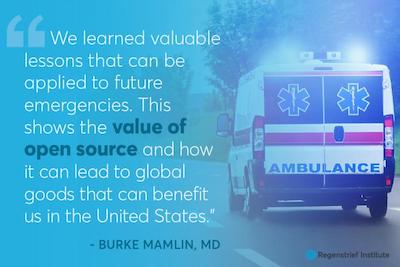 A team from Regenstrief Institute leveraged OpenMRS, a global open-source electronic medical record (EMR), to create an emergency EMR for Indianapolis first responders preparing for a possible influx of COVID-19 patients. This process was completed in a week to allow Indianapolis Emergency Medical Services (IEMS) to register patients, collect basic clinical information, and send these encounters to Indiana's health information exchange, a crucial element to help the response to the COVID-19 pandemic...This work demonstrates that it is possible to leverage existing tools to create EMRs in emergency situations to improve crisis response. "We learned valuable lessons from this experience that can be applied to future emergencies. This system can be adapted to work in other states or even countries, and it can be done very quickly," said Burke Mamlin, M.D., a project leader and member of Regenstrief's Global Health Informatics program. "This shows the value of open source and how it can lead to global goods that can benefit us in the United States."
A team from Regenstrief Institute leveraged OpenMRS, a global open-source electronic medical record (EMR), to create an emergency EMR for Indianapolis first responders preparing for a possible influx of COVID-19 patients. This process was completed in a week to allow Indianapolis Emergency Medical Services (IEMS) to register patients, collect basic clinical information, and send these encounters to Indiana's health information exchange, a crucial element to help the response to the COVID-19 pandemic...This work demonstrates that it is possible to leverage existing tools to create EMRs in emergency situations to improve crisis response. "We learned valuable lessons from this experience that can be applied to future emergencies. This system can be adapted to work in other states or even countries, and it can be done very quickly," said Burke Mamlin, M.D., a project leader and member of Regenstrief's Global Health Informatics program. "This shows the value of open source and how it can lead to global goods that can benefit us in the United States."
- Login to post comments
FirstNet for Emergency Communications: 6 Questions Answered
 The system nicknamed FirstNet was created by Congress in the Middle Class Tax Relief and Job Creation Act of 2012. Under the contract with the government, the group led by AT&T will build, operate and maintain a new nationwide communications network, providing high-speed wireless communications for public safety agencies and personnel. The network will be protected against unauthorized intrusion and strong enough to withstand disasters that might damage other communications systems. Emergency workers will be able to preempt other users’ traffic on the network, and will be able to send and receive as much data as they need to during their emergency work...
The system nicknamed FirstNet was created by Congress in the Middle Class Tax Relief and Job Creation Act of 2012. Under the contract with the government, the group led by AT&T will build, operate and maintain a new nationwide communications network, providing high-speed wireless communications for public safety agencies and personnel. The network will be protected against unauthorized intrusion and strong enough to withstand disasters that might damage other communications systems. Emergency workers will be able to preempt other users’ traffic on the network, and will be able to send and receive as much data as they need to during their emergency work...
- Login to post comments
HIMSS19: Open Source Software for Disaster Preparedness and Response
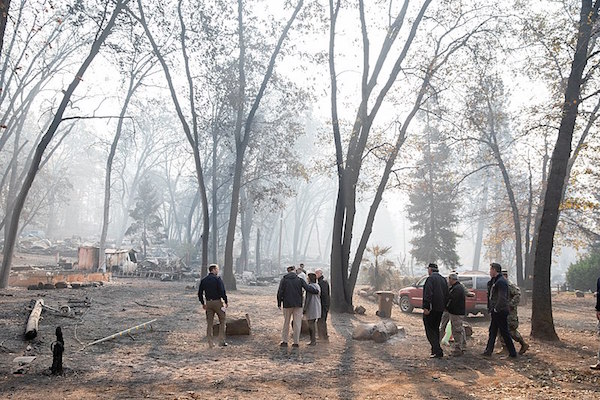 Although not officially listed as a track at the HIMSS19 conference, there are a series of very important presentations on the use of open source software for disaster preparedness and response. This is a critical topic that we have covered extensively in Open Health News. As we detailed in this article, there was a major failure in being able to provide victims of Hurricane Harvey, as well as Hurricane Irma and Hurricane Maria with access to their medical records. Few emergency medical responders could access their records either. The two success stories that came out of the hurricanes were two open source electronic health record (EHR) systems, OpenEMR and the VA's open source VistA EHR.
Although not officially listed as a track at the HIMSS19 conference, there are a series of very important presentations on the use of open source software for disaster preparedness and response. This is a critical topic that we have covered extensively in Open Health News. As we detailed in this article, there was a major failure in being able to provide victims of Hurricane Harvey, as well as Hurricane Irma and Hurricane Maria with access to their medical records. Few emergency medical responders could access their records either. The two success stories that came out of the hurricanes were two open source electronic health record (EHR) systems, OpenEMR and the VA's open source VistA EHR.
- The Future Is Open
- Login to post comments
Humetrix Receives FCC Chairman's Award for Advancements In Accessibility for SOS QR at M-Enabling Summit
 Humetrix, developer of the award-winning SOS QR emergency mobile platform, just received the 2016 FCC Chairman's Award for Advancements in Accessibility (AAA). SOS QR was recognized as an important tool to help individuals with disabilities lead independent lives, during a keynote address by FCC Chairman Tom Wheeler at this week's M-Enabling Summit, in Washington, D.C. Available for iOS, Android devices and the Apple Watch, SOS QR lets anyone create an emergency record that includes contacts, medical conditions, medications and allergies, and makes it available via a QR code on the device' lock screen.
Humetrix, developer of the award-winning SOS QR emergency mobile platform, just received the 2016 FCC Chairman's Award for Advancements in Accessibility (AAA). SOS QR was recognized as an important tool to help individuals with disabilities lead independent lives, during a keynote address by FCC Chairman Tom Wheeler at this week's M-Enabling Summit, in Washington, D.C. Available for iOS, Android devices and the Apple Watch, SOS QR lets anyone create an emergency record that includes contacts, medical conditions, medications and allergies, and makes it available via a QR code on the device' lock screen.
- Login to post comments
Hurricane Irma Just Made a Digital Walkie-Talkie the No. 1 App Online
As Hurricane Harvey dropped anchor over Southeast Texas last week, Zello became the go-to app for rescuers working to save thousands of people trapped by floodwaters. Within days of Harvey's arrival, the app saw a 20-fold increase in usage in Houston, according to Bill Moore, the Austin based startup's the chief executive. As Hurricane Irma hurtles across the Caribbean toward the coast of Florida, Zello continues to boom in popularity. The free Internet "walkie-talkie" app - which relies on cellphone data plans or WiFi and is designed to operate in places where signals are weak - became the top app on iTunes and Google Play Wednesday...
- Login to post comments
Intel Probes The Private-Sector Side Of Open Government Data
After the National Day of Civic Hacking drew 11,000 participants last June, lead sponsor Intel decided to take a deeper look at a few promising applications. The goal, according to Brandon Barnett, director of business innovation at Intel Labs, is to conduct practical experiments on how innovation takes place in and across business teams, and to see how large datasets can be used as fuel for new products and services.
- Login to post comments
Making Personal Health Data Available During an Emergency
- Login to post comments
Recent Hurricanes Have the Coast Guard Rethinking Social Media’s Role in Rescue and Response
The U.S. Coast Guard is still knee-deep in rescue and response efforts as the third major hurricane in three weeks hits the U.S. and its territories. But the agency has already learned a thing or two from its initial response efforts and is thinking about new tools it should develop to better prepare for future disasters. When 911 call centers quickly overloaded in Houston, residents in the area quickly took to Facebook and Twitter to ask for help...
- Login to post comments
The Shutdown Will Harm the Health and Safety of Americans, even After it's Long Over
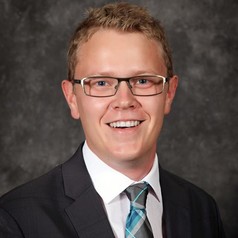 With the U.S. federal government shutdown now the longest in history, it's important to understand what a shutdown means for the health and safety of Americans. The good news is that in the short run, the consequences are relatively few. But, as a researcher who studies natural disaster planning, I believe that Americans should be worried about the federal government's long-term ability to ensure good public health and protect the public from disasters. As the shutdown drags on, it increasingly weakens the government's ability to protect Americans down the road, long after federal workers are allowed to go back to work. Many of these effects are largely invisible and may feel intangible because they don't currently affect specific individuals...
With the U.S. federal government shutdown now the longest in history, it's important to understand what a shutdown means for the health and safety of Americans. The good news is that in the short run, the consequences are relatively few. But, as a researcher who studies natural disaster planning, I believe that Americans should be worried about the federal government's long-term ability to ensure good public health and protect the public from disasters. As the shutdown drags on, it increasingly weakens the government's ability to protect Americans down the road, long after federal workers are allowed to go back to work. Many of these effects are largely invisible and may feel intangible because they don't currently affect specific individuals...
- Login to post comments
Upgrading the PULSE Emergency Response Tool to a Community Edition
 Seven years ago the Office of the National Coordinator for Health Information Technology (ONC) began work on the Patient Unified Lookup System for Emergencies (PULSE). PULSE is an effort to create national resilience by improving first responder access to patient electronic health information they need to provide services and ensure public health during disasters, including public health emergencies. Recently, ONC launched a new, code-only technical solution called PULSE-Community Edition (PULSE Community) that builds on the original PULSE code. PULSE Community enables first responders and other response personnel (e.g., epidemiologists, emergency medical services, and health care volunteers) to securely access vital health information they need during emergencies and disasters from connected health care organizations.
Seven years ago the Office of the National Coordinator for Health Information Technology (ONC) began work on the Patient Unified Lookup System for Emergencies (PULSE). PULSE is an effort to create national resilience by improving first responder access to patient electronic health information they need to provide services and ensure public health during disasters, including public health emergencies. Recently, ONC launched a new, code-only technical solution called PULSE-Community Edition (PULSE Community) that builds on the original PULSE code. PULSE Community enables first responders and other response personnel (e.g., epidemiologists, emergency medical services, and health care volunteers) to securely access vital health information they need during emergencies and disasters from connected health care organizations.
- Login to post comments
Why Ordinary Citizens Are Acting as First Responders in Houston
Harvey hasn’t even finished dumping rain on Texas, but it has already produced an honor roll of heroes. There is, for example, the video of the boat-owning man telling CNN, “We got eight people that done called for us already. So we’re going to go and get them eight, come on back, and try to save some more.” On a larger scale, there’s the so-called Cajun Navy, a Dunkirk-like mobilization of volunteers in fishing boats and pleasure craft that is out working to rescue people. The ethos behind these efforts is straightforward and admirable: Some people are in trouble, and other people have the tools to help them. Why wouldn’t they?...
- Login to post comments